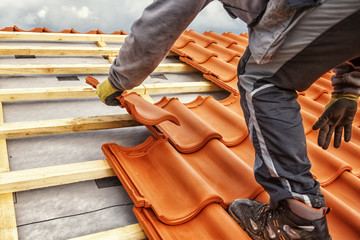Roofing Installation is a noisy process, and it’s best to relocate movable items that may be affected by hammering and dust. It also helps to cover plants and lawn furniture with tarps. Roofers will waterproof valleys (points where two roof sections meet) with underlayment and felt paper. Roofing Columbus GA will install ridge caps to seal the roof’s peak and prevent moisture intrusion.
 The roof is one of the most important parts of your home or building. It protects the residents and their belongings from the elements, including wind, rain, snow and extreme temperatures. An updated, sturdy roof makes a home more attractive to potential buyers and can increase its value. It can also help save on energy costs. In addition, a new roof can come with a manufacturer warranty lasting two to 25 years.
The roof is one of the most important parts of your home or building. It protects the residents and their belongings from the elements, including wind, rain, snow and extreme temperatures. An updated, sturdy roof makes a home more attractive to potential buyers and can increase its value. It can also help save on energy costs. In addition, a new roof can come with a manufacturer warranty lasting two to 25 years.
During the roofing installation process, different types of materials are used to make sure that your roof is safe and secure. For instance, a drip edge is added to the eaves of your house or building, to prevent water damage from seepage. The starter course, a row of three-tab shingles that is placed in the first course of the roof, helps to seal the tabs of the shingles and protects against shingle blow-offs. A valley is a V-shaped area on the roof, and it must be waterproofed with special materials that are designed to withstand the water pressure.
Another material used in the roofing installation is flashing. This is a metal material that is installed around chimneys, roof vents, windows and other joints. It is important to install this correctly, or else you could be leaking water in places you don’t want it to leak.
Other roofing materials include shingles, which are made from asphalt and come in a variety of colors and styles. They are easy to install and are often less expensive than other roofing materials. However, shingles have a limited lifespan and can be prone to damage from hail and wind. They are also not as fire-retardant as other roofing materials, making them a poor choice in areas where wildfires are a risk.
Metal is another option for residential and commercial roofing. Metal roofs are usually long-lasting and can withstand high winds and snow. They are also energy-efficient and can reduce the need for air conditioning. They are available in a variety of styles, including standing seam and corrugated. Galvalume is a good choice for metal roofing because it is easier to work with than other metals. It does not have as many ventilation or air gap requirements and is easier to rollform, cut, and handle.
Time
The time it takes to complete a roofing installation depends on the size of the roof and whether or not it has a complex design. Some roofs feature valleys, facets, and steep slopes that require the crew to work slower to ensure safety. Speeding through these areas can leave you with a poor-quality finished product.
If the roof has a ridge, the contractor will start running underlayment over it. This material is nailed close to the edge and then spread out farther towards the center of the roof. The contractor will continue this pattern until the ridge is reached and the drip edges are covered with underlayment as well.
One of the most challenging factors when estimating the timeline for a roofing project is supply chain issues. Depending on the house’s location and proximity to the supplier, delivery delays can add days or even weeks to the overall completion time.
Safety
A number of safety measures must be taken during a roofing installation to ensure the well-being of workers. This includes providing proper equipment and ensuring that the workers are trained in using the equipment correctly. It also includes following proper roofing techniques, such as avoiding lifting heavy objects or moving large equipment across the roof surface. This can lead to falls or injuries, and it can create a tripping hazard for workers below. In addition, workers should use the proper method of transporting materials to and from the roof. This can be done through hoists or cranes, which are more reliable than carrying heavy materials up and down ladders.
It is also important for workers to wear proper personal protective equipment. This should include a full-body harness that fits properly and is inspected regularly for damage and wear. It should also be connected to a lanyard or self-retracting lifeline, which limits the force of a fall and reduces the risk of injury. Other PPE should include eye protection, hearing protection, and gloves. Workers should wear appropriate footwear for working on the roof, and they should avoid wearing flip-flops or old tennis shoes with poor grip. They should also drink water frequently, and they should take breaks when they are tired or overheated.
Lastly, it is important to prepare the work area before beginning work on the roof. This can be done by clearing debris and obstacles, securing tools and materials, and establishing work zones and barriers. Workers should also be aware of any potential electrical hazards on the roof, and they should take steps to keep a safe distance from them. They should also make sure that the ladder is not extended past its maximum extension length, and they should avoid carrying loads up and down the ladder that are too heavy for it to support.
Roofing contractors should also be mindful of any openings on the roof, such as skylights and roof hatches. They should be sure to cover them with guardrails or covers to prevent falling debris. They should also be aware of any existing electrical hazards on the roof, and they should use non-conductive tools when working near them.
Warranty
When a homeowner hires a roofing contractor to work on their roof, it is important that they receive the best warranty possible. This warranty will protect them against any problems that may arise from the contractor’s workmanship or materials used on the job. A good contractor should be willing to put this warranty in writing and explain it thoroughly to their clients. There are several different types of roof warranties, so it is important that homeowners understand them before making any decisions.
A manufacturer’s warranty is a deal that is offered by the manufacturer of the roofing materials. This will usually cover things like shingles and underlayment. This type of warranty is usually limited in time and can be transferred to new owners. It is important to note that a manufacturer’s warranty does not include labor or installation.
Another type of roofing warranty is the roofer’s workmanship warranty. This is a guarantee that the roofer will repair any leaks or defects in the roof that are caused by their work. A roofer’s workmanship warranty is important because it can help homeowners avoid having to pay for a costly repairs to their home. It is also important to remember that a roofer’s workmanship warranty will not cover things like damage from natural disasters, high winds, or acts of nature.
If a homeowner has any issues with their roof, they should contact the roofing company that provided their roof. The company should have a customer service department that will answer their questions and work with them to find a solution. If the company does not respond or cannot resolve the issue, the Better Business Bureau may step in to mediate the situation.
The bottom line is that a warranty is an investment and it is important to get one that will protect your home for years to come. A warranty will reduce the risk of paying for a costly repair and can increase the return on your investment when you sell your home. A quality roofing company should offer a comprehensive warranty that covers the cost of both labor and materials.



